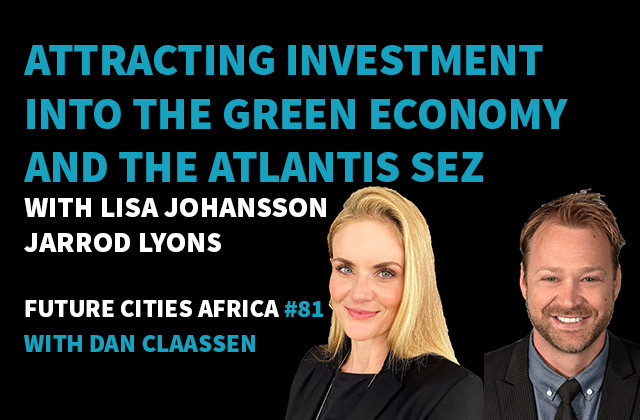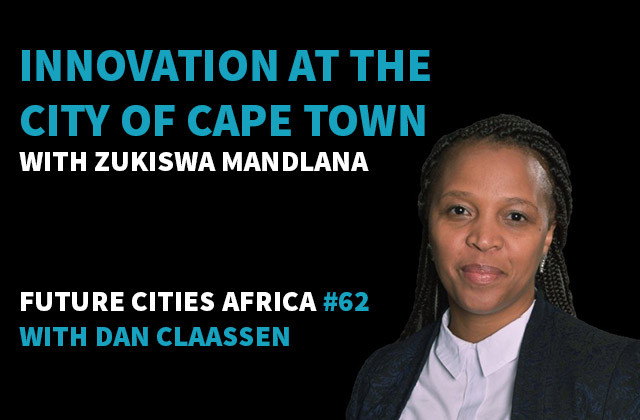Listen to Audio
Key Considerations For Financiers Partnering With Municipalities On Wastewater Treatment Works Energy Projects
Raldo Kruger, Technical Specialist for Green Finance and the Water Sector at GreenCape explains key financial investment opportunities, expected returns on investment, successful financing, due diligence measures, state-level incentives and the current state of municipal readiness to implement energy efficiency and renewable energy projects in municipal Wastewater Treatment Works.
Stay Connected
Overview:
GreenCape is a non-profit organisation that drives the widespread adoption of economically viable green economy solutions from South Africa.
They are working on a multi-stakeholder project with the financial support of the Green Climate Fund, implemented and managed by UNIDO | United Nations Industrial Development Organization, focused on pipeline development to deploy clean energy technology solutions in municipal wastewater treatment works of South Africa, providing readiness activities for the Green Climate Fund.
Ultimately this project aims to support the utilisation of climate finance in the municipal Wastewater Treatment Works space, where Energy Efficient and Renewable Energy applications can assist.
Episode Summary:
- 00:00:00 In this section, Raldo Kruger, Technical Specialist for Green Finance and the Water Sector at Green Cape, discusses the key financial investment opportunities related to energy efficiency and renewable energy projects at municipal wastewater treatment works. He explains that wastewater treatment works are significant energy consumers within municipalities, accounting for around 25% of total electricity usage. Implementing energy efficiency technologies can lead to efficiency gains of up to 15%, while more complex technologies can result in gains of up to 50%. The balance of the energy demand can also be generated from renewable energy sources. Kruger highlights that the savings from implementing these technologies are predictable, creating an opportunity for financiers to partner with municipalities. He emphasizes that it is a no-brainer for municipalities to adopt these technologies, making it an attractive investment opportunity.
- 00:05:00 In this section, Raldo discusses the different categories of technology interventions for wastewater treatment works and how they vary in terms of cost, payback period, and scale. The first category includes low-cost or even no-cost interventions that can be implemented by municipalities with a short payback period of less than a year or two. The second category consists of energy efficiency technologies that can be retrofitted into existing treatment works with a payback period of three years or less. The third category involves large refurbishments or capital-intensive projects that require a complete redesign of the treatment works and have longer payback periods of five to 15 years. Raldo also mentions various financing models such as self-funding, grant funding, and energy services companies that can support these projects based on their payback periods.
- 00:10:00 In this section, Raldo discusses the ownership and financing options for municipal wastewater treatment energy projects. He mentions that municipalities can fully own the technology and benefit from the energy efficiency gained from it. Loan financing may also be an option for larger projects, and in rare cases, a public-private partnership (PPP) could be considered for complex and capital-intensive projects. The speaker emphasizes the importance of due diligence by both municipalities and potential financiers or investors. Municipalities should conduct pre-feasibility and technical feasibility studies to assess the potential for implementing viable projects. Financiers should assess the financial feasibility and viability of the projects and ensure that the municipality has the technical skills and capacity to effectively implement and utilize the technology. Raldo also mentions a municipal readiness index developed in South Africa that considers governance, affordability, and technical capacity to assess municipalities' readiness to implement these projects. Approximately 20% of municipalities in South Africa are deemed to have a high readiness for implementing a wide range of projects.
- 00:15:00 In this section, Raldo Kruger discusses the different levels of readiness municipalities have when it comes to implementing wastewater treatment works energy projects. He states that around 20% of municipalities have low readiness, while another 20% have high readiness. The remaining 60% fall in the middle, with varying degrees of readiness and capacity to implement these projects. He also mentions that there are limited grants available for municipalities, but suggests that municipalities can use these grants for pre-feasibility work and financial modeling, allowing them to secure loan financing or work with an Energy Service Company (ESCO) for implementation. Additionally, Raldo briefly touches on the topic of improving municipalities' credit worthiness, suggesting that it is a complex topic that requires further discussion.
- 00:20:00 In this section, Raldo discusses the importance of better governance and financial management in municipalities to establish creditworthiness. He explains that financiers and investors look at a municipality's senior leadership and financial practices before considering financing a project. He also highlights the two components of creditworthiness: financial governance and affordability. To improve creditworthiness, municipalities can reduce expenditure and increase revenue. He gives the example of wastewater treatment works, where implementing energy-efficient technologies can significantly reduce expenditure and increase creditworthiness. Additionally, improving revenue collection and investing in infrastructure can further enhance creditworthiness and financial viability for municipalities.







